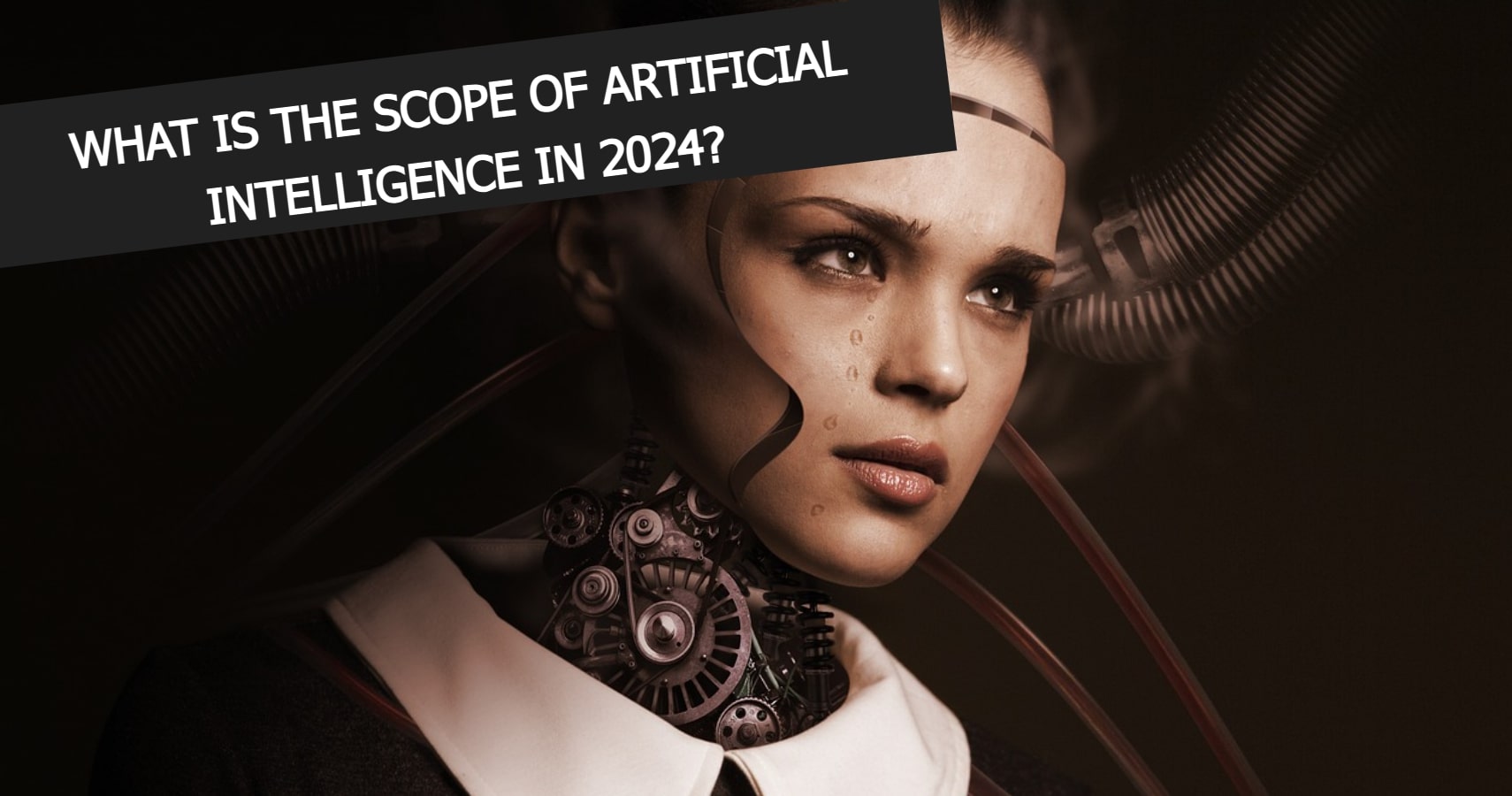Table of Contents
- 1 Scope of Artificial Intelligence in 2024
- 1.1 Evolution of AI
- 1.2 Current Applications
- 1.3 Advancements in Machine Learning
- 1.4 Natural Language Processing Enhancements
- 1.5 AI in Autonomous Systems
- 1.6 Ethical Considerations in AI
- 1.7 AI and Cybersecurity
- 1.8 AI in Customer Experience
- 1.9 Future Job Landscape
- 1.10 Global AI Adoption
- 1.11 Challenges and Limitations
- 1.12 AI in Education
- 1.13 AI and Climate Change
- 1.14 Predictions for AI in 2025
- 1.15 Frequently Asked Questions (FAQs)
Article Outline
- Introduction
- Brief overview of Artificial Intelligence (AI)
- Significance of AI in 2024
- Evolution of AI
- Historical perspective
- Key milestones leading to 2024
- Current Applications
- AI in healthcare
- AI in finance
- AI in manufacturing
- AI in daily life
- Advancements in Machine Learning
- Deep learning breakthroughs
- Reinforcement learning developments
- Natural Language Processing (NLP) Enhancements
- Conversational AI
- Language understanding and generation
- AI in Autonomous Systems
- Autonomous vehicles
- Drones and robotics
- Ethical Considerations in AI
- Bias and fairness
- Privacy concerns
- Responsible AI development
- AI and Cybersecurity
- Threats and challenges
- AI-driven security solutions
- AI in Customer Experience
- Personalization using AI
- Chatbots and virtual assistants
- Future Job Landscape
- Impact on employment
- New opportunities in AI-related fields
- Global AI Adoption
- Regional disparities
- Emerging markets in AI
- Challenges and Limitations
- Technical challenges
- Societal concerns
- AI in Education
- Personalized learning
- AI tools for educators
- AI and Climate Change
- AI for environmental monitoring
- Sustainability initiatives
- Predictions for AI in 2025
- Expert insights and forecasts
- Anticipated breakthroughs
Scope of Artificial Intelligence in 2024
Artificial Intelligence (AI) has evolved exponentially, becoming an integral part of our daily lives. In 2024, the scope of AI reaches unprecedented heights, transforming industries and shaping the future in ways we could only imagine a few years ago.
Evolution of AI
The journey of AI traces back to its inception, with notable milestones shaping its trajectory. From early rule-based systems to the current era of sophisticated machine learning, the evolution sets the stage for the advancements witnessed in 2024.
Current Applications
AI is no longer confined to science fiction; it is a tangible force in various sectors. In healthcare, AI aids in diagnostics and drug discovery. Financial institutions leverage AI for fraud detection, while manufacturing benefits from automation and predictive maintenance. Everyday life is touched by AI through voice assistants and personalized recommendations.
Advancements in Machine Learning
Machine learning, a subset of AI, has seen remarkable progress. Deep learning algorithms now outperform traditional methods, and reinforcement learning is pushing the boundaries of what AI can achieve. These advancements underpin the capabilities of AI systems in 2024.
Natural Language Processing Enhancements
The ability of machines to understand and generate human language has seen significant strides. Conversational AI systems provide more natural interactions, while language models exhibit improved contextual understanding, enhancing communication between humans and machines.
AI in Autonomous Systems
Autonomous vehicles, drones, and robotics are thriving due to AI. In 2024, we witness safer and more efficient transportation systems, as well as advancements in the use of drones for various applications, all powered by sophisticated AI algorithms.
Ethical Considerations in AI
As AI becomes ubiquitous, ethical concerns grow. Issues of bias and privacy demand attention, and developers strive to create AI systems that are not only advanced but also ethically sound. Responsible AI development is crucial to ensure fairness and transparency.
AI and Cybersecurity
With the rise of AI, new threats emerge, requiring innovative cybersecurity solutions. AI-driven security systems prove to be a double-edged sword, both vulnerable to exploitation and indispensable in countering evolving cyber threats.
AI in Customer Experience
In 2024, AI enhances customer experience through personalization and automated support. Chatbots and virtual assistants provide instant responses, creating a seamless interaction between businesses and consumers.
Future Job Landscape
The integration of AI into various industries inevitably impacts the job market. While certain jobs may become obsolete, new opportunities arise in AI-related fields, creating a demand for skills in machine learning, data science, and AI development.
Global AI Adoption
The adoption of AI varies globally, with disparities between developed and emerging markets. Understanding these regional nuances is vital for comprehending the overall landscape of AI in 2024.
Challenges and Limitations
Despite the immense progress, AI faces technical challenges, and societal concerns persist. Striking a balance between innovation and addressing these challenges is crucial for the sustainable growth of AI technologies.
AI in Education
Education embraces AI with personalized learning experiences and AI tools that assist educators. The integration of AI in education aims to cater to individual learning needs and enhance the overall effectiveness of teaching and learning.
AI and Climate Change
AI plays a role in addressing environmental challenges. From monitoring climate patterns to optimizing energy consumption, AI contributes to sustainability efforts and mitigates the impact of climate change.
Predictions for AI in 2025
Experts share insights and predictions for the future of AI. Anticipated breakthroughs include advancements in quantum computing, increased collaboration between AI and human workers, and the emergence of novel AI applications.
In conclusion, the scope of artificial intelligence in 2024 is vast and transformative. As AI continues to advance, ethical considerations, global adoption, and addressing challenges become paramount. The future holds promise, with AI poised to redefine industries and our daily lives in ways we are only beginning to comprehend.
Frequently Asked Questions (FAQs)
- What are the ethical considerations associated with AI in 2024?
- The ethical considerations include issues of bias, privacy concerns, and the need for responsible AI development to ensure fairness and transparency.
- How does AI impact the job market in 2024?
- The integration of AI into industries may lead to certain job roles becoming obsolete, but it also creates new opportunities in AI-related fields, emphasizing the need for skills in machine learning and data science.
- What is the role of AI in addressing climate change?
- AI contributes to environmental efforts by monitoring climate patterns, optimizing energy consumption, and supporting sustainability initiatives.
- What are the challenges faced by AI in 2024?
- AI encounters technical challenges, and societal concerns persist, requiring a balanced approach to innovation and addressing these challenges for sustainable growth.
- What predictions do experts have for AI in 2025?
- Experts anticipate breakthroughs in quantum computing, increased collaboration between AI and human workers, and the emergence of novel AI applications in 2025.




